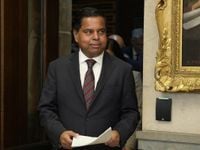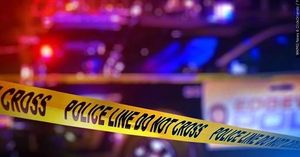On September 29, 2025, the Canadian federal government took the dramatic step of designating the Bishnoi Gang—a notorious India-based criminal organization—as a terrorist entity. This move, announced by Public Safety Minister Gary Anandasangaree, marks a turning point in how Canada confronts transnational organized crime and its impact on diaspora communities.
According to Public Safety Canada, the Bishnoi Gang has been accused of murder, extortion, and intimidation, particularly targeting members of Canada’s South Asian diaspora. The government stated the gang creates a “climate of insecurity” by targeting “prominent community members, businesses, and cultural figures.” The new terrorist listing, made under the Criminal Code, empowers law enforcement to seize property and vehicles owned by the group and freeze its finances. It also provides tools for prosecuting terrorist offences and informs immigration and border decisions under the Immigration and Refugee Protection Act.
The gang is named after its leader, Lawrence Bishnoi, a 32-year-old gangster who, despite being imprisoned in India since 2015, is alleged to still control the group from behind bars. As reported by the BBC, Bishnoi’s criminal career began during his university years, where he was linked to arson, fights, and gunfire incidents. After graduating in 2012, he reportedly ordered several murders. In 2018, he even threatened Bollywood superstar Salman Khan and allegedly plotted to kill him. By 2022, the gang’s membership was estimated at around 700, according to Indian authorities.
The Bishnoi Gang’s reach is not confined to India. Canadian officials describe it as a "transnational criminal organization" with an active presence in Canada, particularly in areas with significant South Asian populations. The gang’s activities have included extortion, smuggling of drugs and weapons, and targeted assassinations. The impact has been felt most acutely in communities like Surrey, Brampton, and Northeast Calgary, where, as Conservative Party Leader Pierre Poilievre put it, “this gang has been responsible for much of the extortion that has terrorized” these areas.
Pressure for the terrorist designation had been mounting for months. The Sikh community, Conservative and NDP leaders, and the premiers of British Columbia and Alberta all called on Prime Minister Mark Carney to act. Poilievre described the decision as “long overdue,” saying at a news conference, “Violence, terror and the intimidation of communities will never be tolerated in Canada.” He added, “There is evidence now that their violence is linked to terror and to political motivations. This is why numerous mayors and premiers, including me and Mayor Patrick Brown from Brampton, have called for this group to be listed as a terrorist body.”
Recent high-profile crimes have further underscored the gang’s influence. In 2022, Punjabi singer Sidhu Moose Wala—who had studied in Ontario—was killed in India, with a man associated with the Bishnoi Gang allegedly planning the murder from Canada. In 2023, Sikh activist Hardeep Singh Nijjar was fatally shot outside a temple in Surrey, British Columbia. The suspects in Nijjar’s killing reportedly had ties to the Bishnoi Gang, as reported by the Vancouver Sun. The fallout from Nijjar’s murder was immediate and severe, leading then-Prime Minister Justin Trudeau to accuse the Indian government of involvement—a claim India has categorically denied. This diplomatic row resulted in the expulsion of six diplomats from each country in October 2024.
The Bishnoi Gang’s reputation for orchestrating violence is not limited to Canada. In October 2024, Indian politician Baba Siddique was murdered in Mumbai, with the gang claiming responsibility. Indian investigators allege the group’s criminal activities are at an “unprecedented high,” with members involved in extorting celebrities, smuggling, and assassinations.
In response to rising threats, the Royal Canadian Mounted Police (RCMP) launched a specialized task force in September 2025 to strengthen investigations into extortion targeting South Asian families and businesses in British Columbia. B.C. Premier David Eby, in June 2025, emphasized the gang’s deep involvement in extortion and other crimes across B.C., Alberta, and Ontario.
The World Sikh Organization of Canada (WSO), a prominent advocacy group, welcomed the terrorist designation. In a news release, the WSO stated, “Canadian law enforcement and intelligence agencies have linked the Bishnoi gang to assassinations, extortions, and intimidation,” and further alleged these activities were “at the direction of the Indian government.” WSO president Danish Singh commented, “While this designation is an important first step that equips law enforcement with stronger tools to confront this menace, it is critical that the true architects of this violence are also held to account.” Singh asserted that the gang’s “criminal activities are at an unprecedented high, with countless businesses facing extortion and threats.”
India’s government, however, has firmly denied any involvement in ordering violence or using the Bishnoi Gang for political ends. In October 2024, Ministry of External Affairs spokesperson Randhir Jaiswal said Canada had failed to act on information India had provided, stating, “India had shared security-related information with the Canadian government regarding gang members, including those of the Lawrence Bishnoi gang, and requested their arrest.” Jaiswal found it “strange” that the RCMP was “blaming the Indian side for crimes committed by these people in Canada.”
The terrorist designation comes at a delicate time for Canada-India relations. After the Nijjar killing, ties between the two countries were badly strained. In August 2025, both nations appointed new high commissioners, signaling tentative efforts to rebuild diplomatic bridges. Nathalie Drouin, Prime Minister Carney’s national security adviser, recently described a “productive meeting” with Indian officials, noting that both sides committed to cooperation and non-interference, including refraining from transnational repression.
For law enforcement, the new powers granted by the terrorist designation are significant. Authorities can now prosecute offences related to financing, travel, and recruitment for terrorism, and can seize or freeze any assets linked to the gang. Immigration and border officials also have new tools to prevent gang members from entering or remaining in Canada.
Yet, the debate is far from over. While some see the move as a necessary step to protect vulnerable communities, others worry it could further complicate Canada’s already fraught relationship with India. The Indian government’s insistence on its own efforts to combat transnational crime stands in stark contrast to Canadian accusations of state-directed violence. The truth, as is often the case in international affairs, may be more nuanced than either side admits.
What’s clear is that the Bishnoi Gang’s influence has crossed borders, sowing fear and insecurity from Punjab to Toronto. Whether this new designation will finally curb their reach—or simply shift the battleground—remains to be seen. For now, Canadian authorities and affected communities are watching closely, hoping this long-awaited action marks the beginning of a safer chapter.





